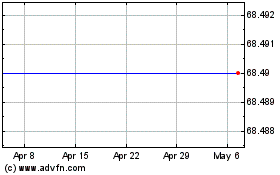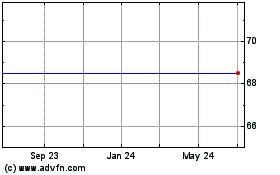Global Blood Therapeutics, Inc. (GBT) (NASDAQ: GBT) today announced
that the U.S. Food and Drug Administration (FDA) has granted both
orphan drug and rare pediatric disease designations for inclacumab
and GBT021601 (GBT601) for the treatment of sickle cell disease
(SCD). Inclacumab is a novel P-selectin inhibitor currently in
Phase 3 clinical trials to evaluate its potential to reduce the
occurrence of vaso-occlusive crises (VOCs) and readmissions due to
VOCs in patients with SCD. GBT601, a next generation sickle
hemoglobin (HbS) polymerization inhibitor, is being studied in a
restarted Phase 1 clinical trial and is expected to advance into
the Phase 2 portion of a Phase 2/3 trial by mid-year. “The FDA’s
orphan drug and rare pediatric disease designations for both
inclacumab and GBT601 are an acknowledgment of the critical and
ongoing unmet need in sickle cell disease and the potential of
GBT’s innovative pipeline of investigational medicines,”
said Kim Smith-Whitley, M.D., executive vice president and
head of research and development at GBT. “We believe that both
inclacumab and GBT601 have the potential to be best-in-class
therapeutic options for the treatment of this devasting disease. We
are excited to continue these clinical development programs to make
progress on our goal of transforming sickle cell disease into a
well-managed condition via multiple therapeutic approaches.”
VOCs take a significant toll on patients and are a leading cause
of hospital readmissions in SCD.1 Patient enrollment is currently
ongoing in two randomized, double-blind, placebo-controlled Phase 3
clinical trials evaluating the safety and efficacy of inclacumab –
dosed quarterly – for the potential treatment of VOCs associated
with SCD. Both studies are enrolling individuals with SCD ages 12
years and older who have experienced between two and 10 VOCs in the
previous year. Inclacumab selectively targets P-selectin, a protein
that mediates cell adhesion and is clinically validated to reduce
pain crises. The first registrational trial, GBT2104-131
(NCT04935879), is evaluating the effect of inclacumab on the
frequency of VOCs. The second registrational trial, GBT2104-132
(NCT04927247), is evaluating the effect of a single dose of
inclacumab on hospital readmission rates.
A Phase 1 study of six SCD patients demonstrated that GBT601,
which has the same mechanism of action as Oxbryta® (voxelotor),
achieved a high target hemoglobin occupancy at daily doses lower
than 500 mg, while maintaining a favorable safety and tolerability
profile. After patients who participated in the earlier Phase 1
study of GBT601 expressed interest in participating in a restart of
the study at a higher dose, GBT recently restarted the Phase 1
study to assess a 150 mg daily dose, greater than the 100 mg daily
maintenance dose previously studied. Upon completion, the company
plans to submit these new data for presentation at a medical
meeting later this year.
The FDA’s orphan drug designation provides orphan status to
drugs and biologics that are being developed to address rare
diseases or disorders that affect fewer than 200,000 people in the
U.S.2 Orphan drug designation qualifies GBT for various incentives,
including tax credits for qualified clinical trials and market
exclusivity if it receives FDA approval. A rare pediatric disease
designation is granted for rare diseases that primarily affect
children under 18 years old, with recipients of this designation
qualifying for a priority review voucher if the drug is approved
and certain conditions are met. The priority review voucher
may be redeemed, transferred, or sold.3
About Sickle Cell Disease Sickle cell
disease (SCD) affects more than 100,000 people in the United
States,4 an estimated 52,000 people in Europe,5 and millions of
people throughout the world, particularly among those whose
ancestors are from sub-Saharan Africa.6 It also affects people of
Hispanic, South Asian, Southern European and Middle Eastern
ancestry.7 SCD is a lifelong inherited rare blood disorder that
impacts hemoglobin, a protein carried by red blood cells that
delivers oxygen to tissues and organs throughout the body.7 Due to
a genetic mutation, individuals with SCD form abnormal hemoglobin
known as sickle hemoglobin. Through a process called hemoglobin
polymerization, red blood cells become sickled, crescent-shaped and
rigid.7,8, 9 The recurrent sickling process causes destruction of
the red blood cells and hemolytic anemia (low hemoglobin due to red
blood cell destruction) and blockages in capillaries and small
blood vessels (vaso-occlusion), which impede the flow of blood and
oxygen delivery throughout the body, commonly referred to as
vaso-occlusive crises (VOCs). The diminished oxygen delivery to
tissues and organs can lead to life-threatening complications,
including stroke and irreversible organ damage.8,9,10,11
Complications of SCD begin in early childhood and can include
neurocognitive impairment, acute chest syndrome, and overt stroke,
among other serious issues.12
About InclacumabInclacumab is a novel, fully
human monoclonal antibody that selectively targets P-selectin, a
protein that mediates cell adhesion and is clinically validated to
reduce pain due to VOCs in people with SCD. Preclinical
results suggest that inclacumab has the potential to be a
best-in-class option for reducing VOCs in people with SCD, with the
potential for quarterly, rather than monthly dosing. GBT has
exclusive worldwide rights to inclacumab as part of the company’s
licensing agreement with Roche. The safety, tolerability and
pharmacokinetics of inclacumab have been evaluated by Roche in more
than 700 non-SCD patients.
About GBT021601Discovered and designed by GBT’s
research and development team, GBT021601 (GBT601) has the same
mechanism of action as Oxbryta® (voxelotor), with the potential for
greater efficacy by achieving higher hemoglobin levels and
occupancy at lower doses. GBT601 is being studied in a single and
multiple ascending dose Phase 1 study assessing the safety,
tolerability, pharmacokinetics and pharmacodynamics of GBT601 in
patients with SCD ages 18 to 60 years. The Phase 2 portion of a
Phase 2/3 study of GBT601 is expected to initiate in mid-2022.
About Global Blood TherapeuticsGlobal Blood
Therapeutics (GBT) is a biopharmaceutical company dedicated to the
discovery, development and delivery of life-changing treatments
that provide hope to underserved patient communities, starting with
sickle cell disease (SCD). Founded in 2011, GBT is delivering on
its goal to transform the treatment and care of SCD, a lifelong,
devastating inherited blood disorder. The company has introduced
Oxbryta® (voxelotor), the first FDA-approved medicine that directly
inhibits sickle hemoglobin (HbS) polymerization, the root cause of
red blood cell sickling in SCD. GBT is also advancing its pipeline
program in SCD with inclacumab, a P-selectin inhibitor in Phase 3
development to address pain crises associated with the disease, and
GBT021601 (GBT601), the company’s next generation HbS
polymerization inhibitor. In addition, GBT’s drug discovery teams
are working on new targets to develop the next generation of
treatments for SCD. To learn more, please visit www.gbt.com and
follow the company on Twitter @GBT_news.
Forward-Looking Statements Certain statements
in this press release are forward-looking within the meaning of the
Private Securities Litigation Reform Act of 1995, including
statements containing the words “will,” “anticipates,” “plans,”
“believes,” “forecast,” “estimates,” “expects” and “intends,” or
similar expressions. These forward-looking statements are based on
GBT’s current expectations and actual results could differ
materially. Statements in this press release may include statements
that are not historical facts and are considered forward-looking
within the meaning of Section 27A of the Securities Act of 1933, as
amended, and Section 21E of the Securities Exchange Act of 1934, as
amended. GBT intends these forward-looking statements, including
statements regarding GBT’s priorities, commitment, dedication,
focus, goals, mission, vision, and positioning; the safety,
efficacy, and mechanism of action of Oxbryta, and other product
characteristics; the commercialization, awareness, delivery,
availability, use, and commercial and medical potential of Oxbryta;
ongoing and planned studies, clinical trials and registries, and
related protocols, activities, timing, and other expectations;
future presentations; impacting the treatment, care, and course of
SCD and mitigating related complications; continuing clinical
development programs and making progress on GBT’s goals; safety,
efficacy, mechanism of action, advancement and potential of
inclacumab, GBT601 and GBT’s other drug candidates and pipeline;
the significance and potential benefits of the FDA’s orphan drug
and rare pediatric disease designations; and working on new targets
and discovering, developing, and delivering treatments, to be
covered by the safe harbor provisions for forward-looking
statements contained in Section 27A of the Securities Act and
Section 21E of the Securities Exchange Act, and GBT makes this
statement for purposes of complying with those safe harbor
provisions. These forward-looking statements reflect GBT’s current
views about its plans, intentions, expectations, strategies, and
prospects, which are based on the information currently available
to the company and on assumptions the company has made. GBT can
give no assurance that the plans, intentions, expectations, or
strategies will be attained or achieved, and, furthermore, actual
results may differ materially from those described in the
forward-looking statements and will be affected by a variety of
risks and factors that are beyond GBT’s control, including, without
limitation, risks and uncertainties relating to the COVID-19
pandemic, including the extent and duration of the impact on GBT’s
business, including commercialization activities, regulatory
efforts, research and development, corporate development
activities, and operating results, which will depend on future
developments that are highly uncertain and cannot be accurately
predicted, such as the ultimate duration of the pandemic, travel
restrictions, quarantines, social distancing, and business closure
requirements in the U.S. and in other countries, and the
effectiveness of actions taken globally to contain and treat the
disease; the risks that GBT is continuing to establish its
commercialization capabilities and may not be able to successfully
commercialize Oxbryta; risks associated with GBT’s dependence on
third parties for research, development, manufacture, distribution,
and commercialization activities; government and third-party payer
actions, including those relating to reimbursement and pricing;
risks and uncertainties relating to competitive treatments and
other changes that may limit demand for Oxbryta; the risks
regulatory authorities may require additional studies or data to
support continued commercialization of Oxbryta; the risks that
drug-related adverse events may be observed during
commercialization or clinical development; data and results may not
meet regulatory requirements or otherwise be sufficient for further
development, regulatory review, or approval; compliance with
obligations under the Pharmakon loan; and the timing and progress
of activities under GBT’s collaboration, license and distribution
agreements; along with those risks set forth in GBT’s Annual Report
on Form 10-K for the fiscal year ended December 31, 2021, and in
GBT’s most recent Quarterly Report on Form 10-Q filed with the U.S.
Securities and Exchange Commission, as well as discussions of
potential risks, uncertainties, and other important factors in
GBT’s subsequent filings with the U.S. Securities and Exchange
Commission. Except as required by law, GBT assumes no obligation to
update publicly any forward-looking statements, whether as a result
of new information, future events, or
otherwise.References
- Elixhauser A and Steiner C, HCUP Statistical Brief #153, April
2013.
- U.S. Food and Drug Administration website. Designating an
Orphan Product: Drugs and Biological Products.
https://www.fda.gov/industry/developing-products-rare-diseases-conditions/designating-orphan-product-drugs-and-biological-products.
Accessed June 3, 2022
- U.S. Food and Drug Administration website. Rare Pediatric
Disease (RPD) Designation and Voucher Programs.
https://www.fda.gov/industry/developing-products-rare-diseases-conditions/rare-pediatric-disease-rpd-designation-and-voucher-programs.
Accessed June 3, 2022.
- Centers for Disease Control and
Prevention website. Sickle Cell Disease
Research. https://www.cdc.gov/ncbddd/hemoglobinopathies/scdc-understanding-sickle-cell-disease.html.
Accessed February 23, 2022.
- European Medicines Agency.
https://www.ema.europa.eu/en/medicines/human/orphan-designations/eu3182125.
Accessed February 23, 2022.
- Centers for Disease Control and Prevention website.
Sickle Cell Disease
(SCD). https://www.cdc.gov/ncbddd/sicklecell/data.html.
Accessed February 23, 2022.
- National Heart, Lung, and Blood Institute website.
Sickle Cell
Disease. https://www.nhlbi.nih.gov/health-topics/sickle-cell-disease.
Accessed February 23, 2022.
- Kato GJ, et al. Sickle cell disease. Nat Rev Dis Primers.
2018;4:18010.
- Rees DC, et al. Lancet. 2010;376(9757):2018-2031.
- Kato GJ, et al. J Clin Invest.
2017;127(3):750-760.
- Caboot JB, et al. Paediatr Respir Rev.
2014;15(1):17-23.
- Kanter J, et al. Blood Rev. 2013 Nov;27(6):279-87.
Contact:
Steven Immergut (media)+1 650 410 3258simmergut@gbt.com
Courtney Roberts (investors)+1 650 351 7881croberts@gbt.com
Global Blood Therapeutics (NASDAQ:GBT)
Historical Stock Chart
From Mar 2024 to Apr 2024

Global Blood Therapeutics (NASDAQ:GBT)
Historical Stock Chart
From Apr 2023 to Apr 2024
